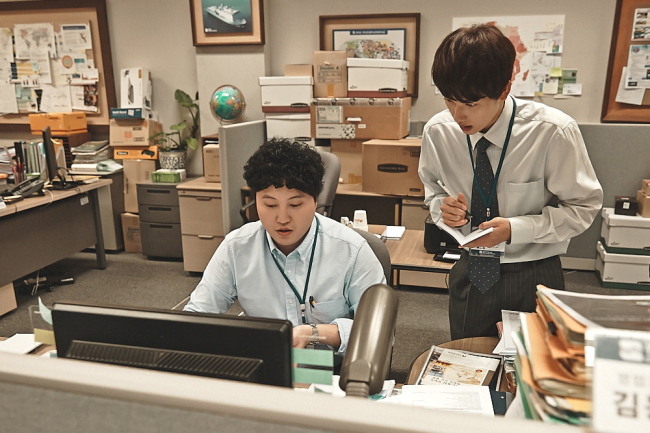Up until recently, the mundane white-collar world was never at the center of attention on the small screen, even in a country known as the hardest-working nation.
More often than not, the office cubicle served merely as a backdrop for a Cinderella story between a large conglomerate’s young, handsome heir and an ordinary female office worker.
But now, viewers are more than eager to watch and sympathize with the average Joe or Jane as they struggle to survive in the office ― even if the show lacks a romantic plot or A-list actors.
“The TV drama ‘Misaeng (Incomplete Life)’ was far from cliche,” said Lee Jae-yoon, a 34-year-old office worker at a consulting firm. “Unlike past TV programs, it accurately portrayed my life and the lives of my colleagues to the extent that watching it felt like I was back in the office.”
‘Misaeng,’ the tale of incomplete lives
At the forefront of office-themed shows is the 2014 cubicle drama “Misaeng,” based on the webtoon of the same name by Yoon Tae-ho.
When Jung Yoon-jung, one of the screenwriters for the show, began writing the script, she was reportedly warned by broadcasting pundits that “Misaeng” could not succeed on TV.
 |
“Misaeng” (tvN) |
But contrary to their beliefs, the 20-episode series became a phenomenal hit here for its realistic depiction of the daily lives of ordinary office workers.
For its finale in December, the drama had an 8.2 percent viewership, a rare milestone for a cable channel show.
The story itself was also original ― the plot revolves around a young man who ends up becoming a contract worker at a large trade company after he fails to make it as a professional baduk (Go) player.
The protagonist Jang Geu-rae struggles to survive in today’s cutting-edge business world. “Misaeng” literally means “not yet alive,” and this is how it is for all the characters, who each have some critical flaw. Yet, it is the drama’s relatable characters and realistic portrayal of office tedium which seem to have appealed to Korean viewers.
‘Queen of the Office’ speaks out for temps
Another cubicle drama that garnered much attention was “Queen of the Office” (2013), broadcast on KBS TV. The protagonist Miss Kim, a temp worker at a food company, was played by seasoned actress Kim Hye-soo. The series was based on the Japanese drama “Pride of the Temp.”
The popularity of the show came mainly from the fact that Miss Kim is not a typical temp worker who hopes to land a full-time position. Instead, she starts work at 9 a.m. and leaves at 6 p.m. She doesn’t care about office politics or gaining the favor of her superiors.
 |
“Queen of the Office” (KBS) |
If the boss asks her to attend an after-work dinner and drinking session, Miss Kim demands overtime pay. When her boss offers her a full-time position, she simply declines and says, “I have no intention of becoming a slave.”
The secret behind living by her own rules is that Miss Kim is an irreplaceable temporary employee with 170 different skills certificates, and speaks at least seven different languages.
“Not everyone can be like Miss Kim,” said 28-year-old office worker Kwak Yoon-jeong, who enjoyed the show. “In reality, you have to work hard at the office, play the office politics game and drink with coworkers if you don’t want to be left behind.”
Office-themed comedy shows in vogue
Office-related TV content has also appeared on variety shows and comedy programs.
The 2014 reality show “First Day of Work” by tvN follows eight celebrities who become real office employees for the first time in their lives. They work at large companies such as a mobile phone service provider or a food franchise business. In the show, Park Joon-hyung of K-pop group g.o.d is habitually late to work, while rapper Eun Ji-won gets in trouble for dressing unprofessionally.
Meanwhile, “Let It Be” is one of the most beloved skits on “Gag Concert,” the longest-running comedy show here. Using the melody of The Beatles song, the comedians sing about the joys and sorrows of office life ― including the Monday blues, payday and office politics ― using sarcasm and satire.
A new variety show kicked off last week titled “Invisible Man,” in which a group of celebrities, including comedian Kang Ho-dong, visits a company and embarks on various games and missions to make the employees laugh.
By Ahn Sung-mi (
sahn@heraldcorp.com)









